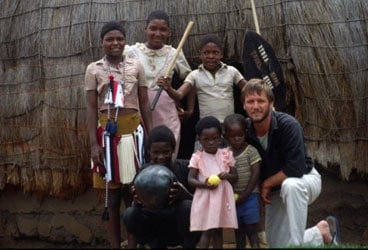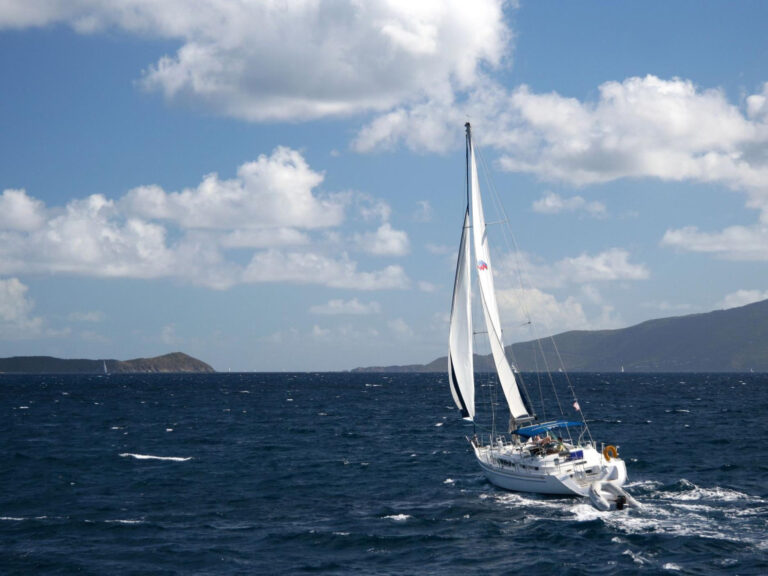
Alvah, shown here in Zululand, South Africa, explained to the students of Loyola Academy how native people from around the world welcomed him into their huts and hearts.
I flew to Chicago this week to address several hundred students at Loyola Academy, a marvelous institution of development and learning. I’m flattered, yet always amazed, that the administrators of these schools would choose me, a wandering old salt with a neer-do-well past I would rather not share in detail, to speak to their precious charges.
These are high school students with malleable minds, perhaps too easily influenced, so the title of my presentation alone might have been cause for concern-“A Life Well Wasted.”
My opening confession was that I was expelled from a similar high school just a few miles down the road in my freshman year. I admitted that I achieved a school record low on my French final of 8%. My teacher explained he awarded me that much only because I had added an “e” to the end of my family name, Simon. That was my cocky little joke.
My problem was, even though only thirteen years old, I already knew exactly what I wanted to be-an adventurer. Where do I sign up for the sailing, scuba diving, and jungle navigation classes? So, for the life of me, I couldn’t see how being chained to a desk in a Math or French class could have the slightest relevance to my life’s plans.
That was until, years later, I was hundreds of miles offshore on my first major ocean passage. My task was to transfer the results of my celestial sight reduction onto our chart. I might have been able to do so had our chart included India, but unfortunately it only covered the Mexican waters we knew ourselves to be in.
Another time, after a 42-day passage, I waded ashore in the Marquesas Islands to discover that although English is reputed to be the international language of business, not a single islander could say so much as good morning in my mother tongue. They spoke French, but I was out of business.
My list went on. Biology and anatomy class-boring, until in an emergency I had to grab the ship’s medical kit in far-flung corner of a dangerous world. I showed the students a photograph of me injecting my brother Jon’s arm with a hypodermic needle. His eyes were closed and he had a euphoric look on his face. I could feel the teachers in the auditorium squirm, until I explained that from the moment we took our first command, we viscerally understood the privilege and opportunity it represented. Unlike so many young Americans of our era, Jon and I would dabble only in medicines, not drugs. We were inoculating ourselves against yellow fever, typhus, and any malady that could even remotely jeopardize our grand venture into this wide and wonderful world.
English class was the worst: “An Ode To A Daffodil”? You’ve got to be kidding me! And yet, when I finally caught on and caught up the self-taught hard way, I found that no field of study impacted my life as much as English. Huddled next to the dull compass light on night watch I read a book that changed my life. David McCullough’s “Path Between The Seas”, his history of the building of the Panama Canal, read like a mystery novel. It was compelling and poignant. It gave me background, context and a deep appreciation for the engineering marvel I was about to see, and the lands and lives of the native people I was about to pass through. It suddenly shifted my life’s narrative from being about my sailing around the world to one of the world I was sailing around.
I learned to love reading, to think, compare, analyze and retain. Books were hard to obtain out there. Yet those that came onboard randomly led me into diverse areas of study and into challenging arenas of thought: geography, geology, anthropology, ethnology, linguistics, history and political science. My horizons stretched out to the farthest of foreign shores.
Photographically, I took the students on a thirteen-year voyage around the world. I showed them how I had been universally taken into the huts and hearts of native people, however primitive or dangerous they were reputed to be. I explained how they shared with me their treasure house of knowledge-spiritual, philosophical, social, scientific, and still relevant to the pressing problems of our age.
I showed them awe inspiring expanses of ocean, desiccating deserts, mountains hauntingly high, and plains unbearably wide. They saw animals of the land, air and sea, from gargantuan to tiny, funny to fierce.
I told them how I love adventure; I live for adventure, but that I now understand that the adventure does not begin at the dock, the jungle wall or the edge of the icepack. It begins in the classrooms of these fine schools. It begins with a focused development of ones body, mind, and spirit. And here in these schools they have a dedicated team of teachers, mentors, and vast resources to satisfy their hopefully ever-increasing curiosity.
I closed by reading a passage from the diary of Ernest Shackelton, for this poet/adventurer summed up my life at sea far better than I ever could.
“In memories we were rich. We had pierced the veneer of outside things. We had suffered, starved, and triumphed, groveled yet grasped at glory, grown bigger in the bigness of the whole. We had seen God in his splendors, heard the text that nature renders. We had reached the naked soul of Man.”
When the lights came up, I am embarrassed to admit that I had tears in my eyes. I fancy myself a tough guy, but I was overwhelmed with the power and potential of this occasion. I hold this profound hope that I somehow touched even one young life out there in those silent seats. If they were encouraged enough to just rise, reach and risk they will set out from these halls to ultimately achieve their bright shining potential.




